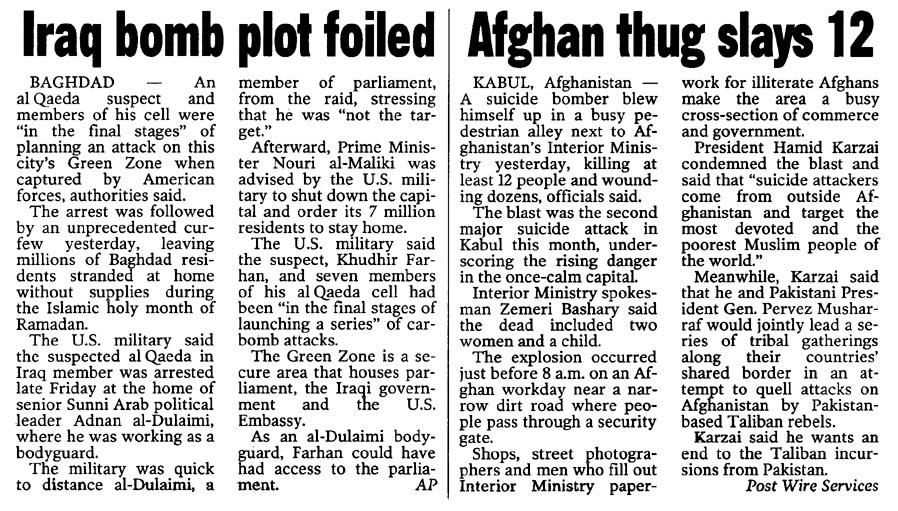Call her the Susan B. Anthony of Afghanistan. Safia Ama Jan fought for women's rights in a chauvinistic society. After the fall of the repressive Taliban regime
in late 2001, she pushed women to vote and take part in civic life.
"This country has had two-and-a-half decades during which both males and
females have been left uneducated," she said two years ago. "You cannot change their minds overnight. We need some time."
Tragically, Ama Jan didn't get that time.
On Monday, suspected Taliban assassins gunned her down as she went
to work in a taxi. The southern Kandahar government, where she ran the women's department, had denied her requests for a bodyguard.
Ama Jan's death at age 65, like the proverbial canary in a coal mine, raises
a larger, and very disturbing, question: Is she a symbol of where Afghanistan's fledgling democracy is heading? It's not just
that she was a victim of a dangerously resurgent Taliban. She was also facing an uphill battle in her fight for women's rights
in Afghan society more broadly.
Her courage, and that of many other Afghan women, was bolstered by the Bush
administration after it ousted the Taliban. The United States pushed for democracy and insisted that women take full part.
It helped get girls back into school (the Taliban had kept them illiterate and at home) and helped craft a constitution ensuring
women one quarter of the seats in the new parliament.
But now, women's equality is moving in the wrong direction. "We do have
rights on paper, but we don't have them in reality," Fatima Kazimyan, one women's representative, told The Philadelphia
Inquirer.
The signs are everywhere. Female members of parliament say they are not
taken seriously. Most have been dropped from high government positions.
The most obvious problem is one of declining security. The Taliban are attacking
girls' schools. NATO forces, which have taken over from U.S. troops in the south, are facing fierce battles. Warlords reign in many areas.
The heroin trade, which fuels both the Taliban and the warlords, is at an all-time high.
But security concerns can't be an excuse to dim the spotlight on women's
rights. On Tuesday, at a news conference with Afghan President Hamid Karzai, Bush lamented Ama Jan's death - to illustrate
the nature of the enemy in the war on terror.
Also disturbing, though, is the sidelining of women in the government and
courts - hampering their struggle against the spread of harsh sharia law, which denies women most rights. This trend
is replicating itself in Iraq, which, under Saddam Hussein's brutal yet secular regime, was one of the Middle East countries where women experienced the least discrimination.
Renewed U.S. focus on the everyday battles of women such as Safia Ama Jan
can better honor her and what she fought for - perhaps even, one day, with a coin of her own.
-----------------------------------------------
NEW YORK POST http://www.NYPOST.com
| PRESS
FOR A LARGER COPY |

|
|
|
If these terrorists are allowed to come to America,
their goals will be the same. They will kill men, women and children, who do not follow their radical ways.
If a life doesn't mean much to them, civil rights mean even less... History will prove that Iran is behind
much of the terrorism around the world.
Village Left An Ashtray (It
could happen again.): http://www.americans-working-together.com/id222.html
| PRESS FOR A LARGER COPY TO READ |

|
| PRESS FOR A LARGER COPY TO READ |

